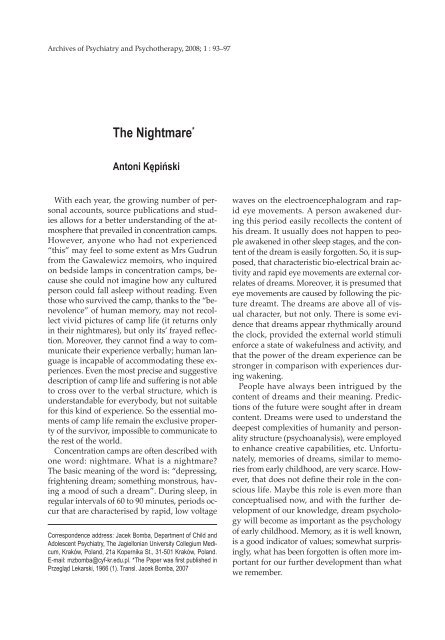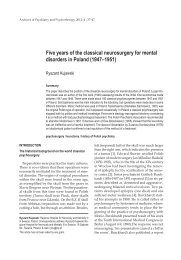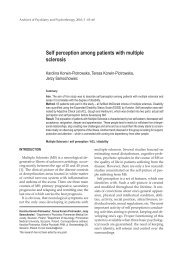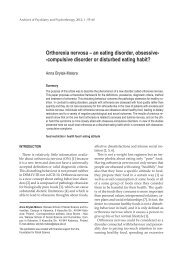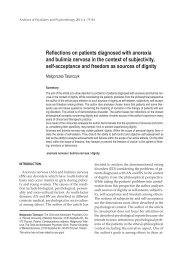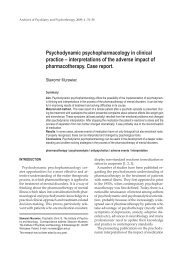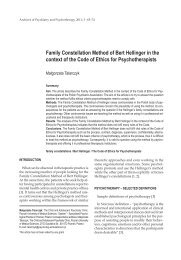93 The Nightmare - Archives of Psychiatry and Psychotherapy ...
93 The Nightmare - Archives of Psychiatry and Psychotherapy ...
93 The Nightmare - Archives of Psychiatry and Psychotherapy ...
Create successful ePaper yourself
Turn your PDF publications into a flip-book with our unique Google optimized e-Paper software.
<strong>Archives</strong> <strong>of</strong> <strong>Psychiatry</strong> <strong>and</strong> <strong>Psychotherapy</strong>, 2008; 1 : <strong>93</strong>–97<br />
<strong>The</strong> <strong>Nightmare</strong> *<br />
Antoni Kępiński<br />
With each year, the growing number <strong>of</strong> personal<br />
accounts, source publications <strong>and</strong> studies<br />
allows for a better underst<strong>and</strong>ing <strong>of</strong> the atmosphere<br />
that prevailed in concentration camps.<br />
However, anyone who had not experienced<br />
“this” may feel to some extent as Mrs Gudrun<br />
from the Gawalewicz memoirs, who inquired<br />
on bedside lamps in concentration camps, because<br />
she could not imagine how any cultured<br />
person could fall asleep without reading. Even<br />
those who survived the camp, thanks to the “benevolence”<br />
<strong>of</strong> human memory, may not recollect<br />
vivid pictures <strong>of</strong> camp life (it returns only<br />
in their nightmares), but only its’ frayed reflection.<br />
Moreover, they cannot find a way to communicate<br />
their experience verbally; human language<br />
is incapable <strong>of</strong> accommodating these experiences.<br />
Even the most precise <strong>and</strong> suggestive<br />
description <strong>of</strong> camp life <strong>and</strong> suffering is not able<br />
to cross over to the verbal structure, which is<br />
underst<strong>and</strong>able for everybody, but not suitable<br />
for this kind <strong>of</strong> experience. So the essential moments<br />
<strong>of</strong> camp life remain the exclusive property<br />
<strong>of</strong> the survivor, impossible to communicate to<br />
the rest <strong>of</strong> the world.<br />
Concentration camps are <strong>of</strong>ten described with<br />
one word: nightmare. What is a nightmare?<br />
<strong>The</strong> basic meaning <strong>of</strong> the word is: “depressing,<br />
frightening dream; something monstrous, having<br />
a mood <strong>of</strong> such a dream”. During sleep, in<br />
regular intervals <strong>of</strong> 60 to 90 minutes, periods occur<br />
that are characterised by rapid, low voltage<br />
Correspondence address: Jacek Bomba, Department <strong>of</strong> Child <strong>and</strong><br />
Adolescent <strong>Psychiatry</strong>, <strong>The</strong> Jagiellonian University Collegium Medicum,<br />
Kraków, Pol<strong>and</strong>, 21a Kopernika St., 31-501 Kraków, Pol<strong>and</strong>.<br />
E-mail: mzbomba@cyf-kr.edu.pl. *<strong>The</strong> Paper was first published in<br />
Przegląd Lekarski, 1966 (1). Transl. Jacek Bomba, 2007<br />
waves on the electroencephalogram <strong>and</strong> rapid<br />
eye movements. A person awakened during<br />
this period easily recollects the content <strong>of</strong><br />
his dream. It usually does not happen to people<br />
awakened in other sleep stages, <strong>and</strong> the content<br />
<strong>of</strong> the dream is easily forgotten. So, it is supposed,<br />
that characteristic bio-electrical brain activity<br />
<strong>and</strong> rapid eye movements are external correlates<br />
<strong>of</strong> dreams. Moreover, it is presumed that<br />
eye movements are caused by following the picture<br />
dreamt. <strong>The</strong> dreams are above all <strong>of</strong> visual<br />
character, but not only. <strong>The</strong>re is some evidence<br />
that dreams appear rhythmically around<br />
the clock, provided the external world stimuli<br />
enforce a state <strong>of</strong> wakefulness <strong>and</strong> activity, <strong>and</strong><br />
that the power <strong>of</strong> the dream experience can be<br />
stronger in comparison with experiences during<br />
wakening.<br />
People have always been intrigued by the<br />
content <strong>of</strong> dreams <strong>and</strong> their meaning. Predictions<br />
<strong>of</strong> the future were sought after in dream<br />
content. Dreams were used to underst<strong>and</strong> the<br />
deepest complexities <strong>of</strong> humanity <strong>and</strong> personality<br />
structure (psychoanalysis), were employed<br />
to enhance creative capabilities, etc. Unfortunately,<br />
memories <strong>of</strong> dreams, similar to memories<br />
from early childhood, are very scarce. However,<br />
that does not define their role in the conscious<br />
life. Maybe this role is even more than<br />
conceptualised now, <strong>and</strong> with the further development<br />
<strong>of</strong> our knowledge, dream psychology<br />
will become as important as the psychology<br />
<strong>of</strong> early childhood. Memory, as it is well known,<br />
is a good indicator <strong>of</strong> values; somewhat surprisingly,<br />
what has been forgotten is <strong>of</strong>ten more important<br />
for our further development than what<br />
we remember.<br />
Księga1<strong>Archives</strong>_08.indb <strong>93</strong> 2008-03-04 12:53:52
94 Antoni Kępiński<br />
Among the few dreams that are remembered<br />
are those that are described as nightmares. If<br />
all dreams could be remembered, the number<br />
<strong>of</strong> nightmares would be much larger. It is not<br />
known what influences the content <strong>of</strong> dreams<br />
- is it transformation <strong>of</strong> wake state experience<br />
only? Or as Jung declared, is it autonomous?<br />
Some dream motives recur independently from<br />
the personal history <strong>of</strong> a dreamer, in various cultures<br />
<strong>and</strong> epochs (archetypes).<br />
A nightmare is above all a horrible dream; situations,<br />
figures, the whole entourage, are so distant<br />
from any experience in reality, fantasy, or<br />
other dreams, that this “strangeness” evokes<br />
horror accompanied by helplessness. Every<br />
dream is accompanied by helplessness, it being<br />
a characteristic <strong>of</strong> sleep itself. Nevertheless, in a<br />
nightmare, as a consequence <strong>of</strong> detachment from<br />
common experience, it becomes overwhelming.<br />
When everything becomes different than usual,<br />
one loses orientation <strong>and</strong> ability to plan action,<br />
<strong>and</strong> therefore feels paralysed. In a nightmare<br />
one fights for life; the characteristic <strong>of</strong> a<br />
nightmare is total danger.<br />
Anxiety <strong>and</strong> tension in a nightmare are enhanced<br />
by the feeling <strong>of</strong> helplessness. Everything<br />
occurs automatically, independent <strong>of</strong> the dreamer,<br />
<strong>and</strong> action develops as in a horror movie; one<br />
is engaged, but has no influence on its course.<br />
In climax moments, one tries to liberate oneself<br />
<strong>and</strong> finds that this is only a dream, awakens tormented,<br />
with heart pounding, <strong>and</strong> covered with<br />
sweat, but relieved by reality which is dramatically<br />
different from the dream content.<br />
<strong>The</strong> characteristics <strong>of</strong> nightmares can be listed<br />
as four features: horror, helplessness, total danger<br />
<strong>and</strong> automatism. <strong>The</strong>se four also characterise<br />
the concentration camp experience.<br />
<strong>The</strong> horror <strong>of</strong> concentration camps was especially<br />
felt at the first exposure. <strong>The</strong> majority <strong>of</strong><br />
prisoners reacted with “transient mental reaction<br />
manifested with sadness, anxiety <strong>and</strong> fear,<br />
helplessness, disorientation <strong>and</strong> loneliness, lack<br />
<strong>of</strong> appetite <strong>and</strong> somnolence” (Teutsch). Similarly<br />
as in nightmares, vegetative symptoms were<br />
present: “polyuria, diarrhoea, tremor, sweating,<br />
sometimes nausea, even vomiting” (Teutsch). As<br />
happens in a nightmare, people tried to defend<br />
themselves, thinking that this was only a dream;<br />
a defense against camp nightmare was derealisation,<br />
a feeling <strong>of</strong> unreality <strong>of</strong> the surrounding<br />
reality. In his research, Teutsch found it relatively<br />
rare (at 5% <strong>of</strong> former prisoners interviewed);<br />
however, according to other researchers such a<br />
reaction was typical.<br />
It does not need to be proven that concentration<br />
camp reality significantly differed from<br />
free world reality to such a degree, that everybody<br />
thrown into it must have been shocked.<br />
Of course those who previously went through<br />
Gestapo prisons were, to some extent, accustomed<br />
to the new reality, <strong>and</strong> their reaction was<br />
usually less dramatic. Even an indirect confrontation<br />
with concentration camp life, e.g. visits<br />
to camp site museums, looking at photographs,<br />
reading memoirs etc., causes, to some extent, a<br />
similar reaction <strong>of</strong> bewilderment, anxiety, sadness,<br />
or a feeling <strong>of</strong> unreality. This reaction, however,<br />
is <strong>of</strong> course much weaker. Unusual situations<br />
always evoke anxiety, which can be described<br />
as “disintegrative”, caused by disorganisation<br />
in the existing interaction structure, <strong>and</strong><br />
built up throughout a lifetime between an individual<br />
<strong>and</strong> his or her surroundings. This structure<br />
enables the individual to foresee, to some<br />
extent, future events <strong>and</strong> enables activity planning.<br />
However, life constantly brings new <strong>and</strong><br />
extraordinary events, <strong>and</strong> interaction structures<br />
change, are destroyed, <strong>and</strong> reconstructed; however,<br />
“new” is never completely new, <strong>and</strong> many<br />
familiar elements remain unchanged. In consequence,<br />
even in extraordinary situations one<br />
never becomes completely helpless. <strong>The</strong>re is a<br />
limit in tolerance for extraordinary events that<br />
are understood as different from what one is accustomed<br />
to. When this limit is exceeded, an individual<br />
reacts with fear <strong>and</strong> helplessness. Panic<br />
paralyses purposeful action, inability to act increases<br />
anxiety – one enhances the other. Extensive<br />
discussion concerning factors influencing<br />
disintegration tolerance is beyond the scope <strong>of</strong><br />
this paper. Nevertheless, inborn predisposition<br />
<strong>and</strong> previous experience in dealing with unusual<br />
situations, which enhance the plasticity <strong>of</strong> reactions<br />
<strong>and</strong> adaptation skills, as well as nervous<br />
system efficiency, must be taken into account.<br />
Organic brain conditions evidently decrease disintegration<br />
tolerance; a new situation, therefore,<br />
may cause a Goldstein catastrophic reaction. Disintegration<br />
tolerance also commonly decreases<br />
in elderly, due to a senile organic brain condi-<br />
<strong>Archives</strong> <strong>of</strong> <strong>Psychiatry</strong> <strong>and</strong> <strong>Psychotherapy</strong>, 2008; 1 : <strong>93</strong>–97<br />
Księga1<strong>Archives</strong>_08.indb 94 2008-03-04 12:53:52
tion; this is reflected in a proverb: “One should<br />
not transfer an old tree”.<br />
A “Welcome ceremony” performed when Zugangs<br />
arrived to concentration camps led to escalating<br />
confusion <strong>and</strong> helplessness in prisoners.<br />
If a prisoner did not manage to recover from<br />
this state, he or she would gradually become an<br />
automaton <strong>and</strong> “a muslim”. Physicians who<br />
survived the camp emphasise that neurotic <strong>and</strong><br />
psychosomatic conditions disappeared there.<br />
This could be interpreted as a beneficial consequence<br />
<strong>of</strong> the destruction <strong>of</strong> pre-camp pathogenic<br />
life-styles. Furthermore, a high level <strong>of</strong> biological<br />
risk could be a sort <strong>of</strong> mobilising effect,<br />
annihilating neurotic stagnation <strong>and</strong> disequilibrium.<br />
Concentration camps were extermination<br />
camps, an integral part <strong>of</strong> the plan to destroy<br />
all which endangered the “wonderful German<br />
race”. <strong>The</strong>refore, total endangerment was an essential<br />
characteristic <strong>of</strong> camp life. We still do<br />
not know how survival was possible at all. “A<br />
diet intended for rats, which followed rules employed<br />
in concentration camps even when quantity<br />
restrictions were not used to experiment,<br />
leads to a hunger disease syndrome in animals<br />
within three months” – writes Kowalczykowa.<br />
Hunger was but only one <strong>of</strong> the types <strong>of</strong> suffering<br />
imposed on prisoners, <strong>and</strong> not all survivors<br />
rated it at the first position. Analysis <strong>of</strong> camp<br />
experiences, it seems, calls for a revision <strong>of</strong> the<br />
traditional medical approach which emphasizes<br />
the role <strong>of</strong> physiological <strong>and</strong> biochemical factors<br />
<strong>and</strong> neglects psychological ones. Violation <strong>of</strong> human<br />
dignity, loss <strong>of</strong> significant others, <strong>and</strong> lack<br />
<strong>of</strong> moral support within the group <strong>of</strong> co-prisoners<br />
were <strong>of</strong>ten more painful then the physical<br />
sufferings. <strong>The</strong> majority <strong>of</strong> camp survivors <strong>and</strong><br />
writers on the topic agree that the factors essential<br />
for survival were a desire to survive, belief<br />
that the camp is not eternal, <strong>and</strong> mutual support<br />
within the group <strong>of</strong> colleagues <strong>and</strong> friends. <strong>The</strong><br />
person who broke down, perished.<br />
In life endangerment situations the first biological<br />
rule - fight for life preservation – is especially<br />
evident. In the camp, its manifestations<br />
were <strong>of</strong>ten quite drastic. Sterkowicz writes: “it is<br />
easy to be honest in comfortable conditions; it is<br />
much more difficult in articulo mortis”. Brzezicki,<br />
in his memoirs from Sachsenhausen, describes<br />
himself <strong>and</strong> colleagues: “In a month all polish-<br />
<strong>Archives</strong> <strong>of</strong> <strong>Psychiatry</strong> <strong>and</strong> <strong>Psychotherapy</strong>, 2008; 1 : <strong>93</strong>–97<br />
<strong>The</strong> <strong>Nightmare</strong> 95<br />
ness slowly disappeared from all <strong>of</strong> us”. It seems<br />
to be self-evident, that behavioural norms suitable<br />
for normal life were useless in the camp. In<br />
consequence, ethical assessment is difficult, especially<br />
by those who did not survive the camp<br />
themselves. Nevertheless – with all brutality<br />
<strong>and</strong> biologisation in camp life resulting from the<br />
highest value <strong>of</strong> food <strong>and</strong> death, all other aspects<br />
eliminated – to survive one had to escape from<br />
the imperative: stay alive at every price. Those<br />
who subdued to it were loosing their humanity,<br />
<strong>and</strong> with this, <strong>of</strong>ten a chance for survival.<br />
Among human characteristics essential for survival<br />
was the ability to build up an inner opposition<br />
against external reality, by the creation <strong>of</strong><br />
an alternative reality in fantasy about the future,<br />
memories <strong>of</strong> the past, real friendships, help for<br />
other prisoners, efforts to organise other forms<br />
<strong>of</strong> living, etc. This was the only way to separate<br />
oneself from concentration camp life automatism.<br />
Rules <strong>of</strong> biology, when maximally intensive,<br />
change a human being into an automaton;<br />
he/she is no longer ruling himself/herself. Hunger,<br />
pain, <strong>and</strong> fear <strong>of</strong> death rule him/her as the<br />
first rule to preserve life; sexual drive rules as<br />
the second: to preserve species. In concentration<br />
camp life the second rule was pushed aside <strong>and</strong><br />
the first one was dominant. It was a paradox: the<br />
fight to survive, a normal reaction to dominating<br />
the camp tendency to exterminate, increased<br />
the feeling <strong>of</strong> being a helpless automaton in the<br />
context <strong>of</strong> the biology needs. Automatism was<br />
a feature <strong>of</strong> the concentration camp nightmare<br />
that contributed significantly to annihilation <strong>of</strong><br />
the individual. Thus the rule to preserve life was<br />
acting against itself. A person unable to oppose<br />
it, unable to combat his/her hunger, fear, pain, or<br />
to think even for a while about something other<br />
than the immediate agonizing surroundings sentenced<br />
himself/herself to death. He/she was becoming<br />
a will-less organism automatically wrestling<br />
for preservation <strong>of</strong> life, quickly loosing his/<br />
her strengths <strong>and</strong> changing into “a muslim”.<br />
Horrifying camp scenery, humiliation <strong>of</strong> human<br />
dignity from the first moment, physical<br />
<strong>and</strong> moral torture, hunger, pain, fear <strong>of</strong> death<br />
<strong>and</strong> an amount <strong>of</strong> suffering difficult to describe,<br />
caused every prisoner in the camp to feel completely<br />
helpless, at least in the beginning before<br />
one could become detached <strong>and</strong> develop his/her<br />
camp modus vivendi. <strong>The</strong> attitude from the out-<br />
Księga1<strong>Archives</strong>_08.indb 95 2008-03-04 12:53:53
96 Antoni Kępiński<br />
set was to treat prisoners as automatons, to exploit<br />
their powers to work until they were exterminated.<br />
Under enormous external pressure,<br />
<strong>and</strong> at the same time confused by the horrifying<br />
camp world surrounding him/her, the prisoner<br />
was forced to perceive himself/herself as<br />
an automaton deprived <strong>of</strong> will, pushed around,<br />
beaten, mistreated, that blindly followed orders,<br />
<strong>and</strong> was concerned only with fulfilment <strong>of</strong> basic<br />
needs. If unable to oppose external pressure, or<br />
to see himself/herself not as the perpetrators did,<br />
a prisoner quickly realised the plan <strong>of</strong> the perpetrators<br />
– he/she became “a muslim” <strong>and</strong> died<br />
in disgrace. Disgrace <strong>and</strong> disrespect for death<br />
was but one <strong>of</strong> characteristics <strong>of</strong> concentration<br />
camp life. Human culture is characterised by respect<br />
for death <strong>and</strong> the cult <strong>of</strong> the dead, expressing<br />
human longing for immortality. A prisoner<br />
<strong>of</strong> a concentration camp, who was no longer a<br />
human being, had to be deprived <strong>of</strong> this human<br />
aspect too.<br />
<strong>The</strong> problem <strong>of</strong> automatism is connected with<br />
the problem <strong>of</strong> authority <strong>and</strong> the structure authority<br />
enforces on its subordinates. From an authoritarian<br />
point <strong>of</strong> view, the ideal organisation<br />
is to turn subordinates into performers, which<br />
blindly follow orders. To achieve this, they must<br />
be soaked in ideology <strong>and</strong> put into a structure,<br />
which is to be realised. This manoeuvre succeeding,<br />
the automatism <strong>of</strong> authority structure develops<br />
in a cascade reaction. Everything opposing<br />
the structure must be destroyed. <strong>The</strong> only ethical<br />
criterion becomes following orders blindly. Perception<br />
<strong>of</strong> the world becomes simplified: goodness<br />
is only that, which is congruent with the<br />
structure imposed by the authority; evil is that,<br />
which opposes. Destruction <strong>of</strong> “evil”, which<br />
enables the realisation <strong>of</strong> aggressive tendencies<br />
present in every human being, develops in<br />
a chain reaction pattern. Outside the structure<br />
believed in, only evil is seen, <strong>and</strong> evil must be<br />
destroyed; destroying evil becomes merit.<br />
Even if there is no real risk but a specific ideological<br />
construction is in use, life can be reduced<br />
to the first biological rule: “I win or perish”. This<br />
pseudo-biologisation (“pseudo”, as born out <strong>of</strong><br />
a false concept <strong>of</strong> the surrounding world) leads<br />
to brutalisation <strong>of</strong> life, changes it into a nightmare<br />
<strong>of</strong> fighting for survival, <strong>and</strong> one cannot<br />
oppose being sucked into the nightmare. Both<br />
sides - persecutors <strong>and</strong> persecuted – are incorpo-<br />
rated into the hell machinery <strong>of</strong> destruction; the<br />
former could not resist being overwhelmed by<br />
the idea <strong>of</strong> Herrenvolk <strong>and</strong> bind by obedience to<br />
authority, the latter – are crushed by it. For both<br />
- “I win or perish” - became the main axiom. <strong>The</strong><br />
latter were in real biological endangerment, the<br />
former in fictional danger presented by the false<br />
ideology. Both could not be themselves: the automatism<br />
<strong>of</strong> life that was reduced to a biological<br />
fight for survival did not allow this in the prisoners,<br />
the automatism <strong>of</strong> being overthrown <strong>and</strong><br />
the accepted ideology – in the persecutors.<br />
<strong>The</strong> precondition <strong>of</strong> survival in the concentration<br />
camp was to escape, at least to some extent,<br />
from the camp nightmare. This required resistance<br />
to its four essential characteristics: horror,<br />
powerlessness, biological endangerment <strong>and</strong><br />
automatism. Two mechanisms to achieve this<br />
were <strong>of</strong> special importance: blunting <strong>of</strong> affect<br />
<strong>and</strong> holding on to even weak elements <strong>of</strong> the<br />
former life structure.<br />
“In majority <strong>of</strong> interviewed – writes Teutsch<br />
– during the first 3 - 6 months in concentration<br />
camp, desensitisation, blunting <strong>of</strong> affect, <strong>and</strong> decrease<br />
<strong>of</strong> emotional reactions to various stresses<br />
<strong>of</strong> camp life had developed.” <strong>The</strong> author emphasised<br />
that emotional bluntness <strong>of</strong> this kind<br />
would be, in normal life conditions, recognised<br />
as pathological; in concentration camp it was<br />
“an adaptation phenomenon, helpful in tolerating<br />
camp life conditions, preventing breaking<br />
down <strong>and</strong> death.”<br />
<strong>The</strong> slightest memories <strong>of</strong> the former, noncamp<br />
life, allowed the prisoner, even for a moment,<br />
to escape from the overwhelming reality,<br />
<strong>and</strong> this way remain himself/herself, <strong>and</strong> not a<br />
prisoner-automaton. This was the first step towards<br />
inner freedom. Signs <strong>of</strong> human feelings,<br />
kindness, meeting somebody known before imprisonment,<br />
recollections <strong>of</strong> the past events, fantasising<br />
about the future, pr<strong>of</strong>essors’ lectures in<br />
Sachsenhausen, etc., all brought back the old life<br />
structure. <strong>The</strong>refore, a dispassionate attitude towards<br />
real events, <strong>and</strong>, on the other h<strong>and</strong>, sensitivity<br />
to what supported the normal picture <strong>of</strong><br />
life, enhanced perspectives for survival; the prisoner<br />
was not becoming an automaton, but was<br />
preserving his/her humanity.<br />
An important aspect <strong>of</strong> being human is the<br />
ability to choose <strong>and</strong> make decisions. An automaton,<br />
as it is known, does not possess these fac-<br />
<strong>Archives</strong> <strong>of</strong> <strong>Psychiatry</strong> <strong>and</strong> <strong>Psychotherapy</strong>, 2008; 1 : <strong>93</strong>–97<br />
Księga1<strong>Archives</strong>_08.indb 96 2008-03-04 12:53:53
ulties. Concentration camp organisation tended,<br />
above all, to destroy these features. This was<br />
the first step towards annihilation <strong>of</strong> humanity,<br />
<strong>and</strong> then biological extermination. Memories <strong>of</strong><br />
former prisoners show that planning a choice,<br />
decision making <strong>and</strong> action taking were possible<br />
in the group. Alone, the prisoner felt powerless;<br />
in a group <strong>of</strong> co-prisoners, he/she became selfconfident.<br />
“We can” was followed by “I can”.<br />
Free space, necessary for all purposeful activities,<br />
was at first a collective space, <strong>and</strong> only later<br />
an individual one, when the prisoner, supported<br />
by companions, stopped feeling crushed<br />
by the camp machinery <strong>and</strong> was strong enough<br />
to resist it.<br />
<strong>The</strong> role <strong>of</strong> “group psychotherapy” in the<br />
camp was emphasised by a psychiatrist from Vienna,<br />
Frankl, in his concentration camp memoirs.<br />
<strong>The</strong> Auschwitz Camp hospital, at the time<br />
when political prisoners had settled there, could,<br />
we can presume, be therapeutic not due to medication<br />
applied or operations performed, but<br />
rather due to the friendly atmosphere <strong>and</strong> humanitarian<br />
characteristics. Memoirs from the<br />
camp bring many examples <strong>of</strong> close dependence<br />
between physical <strong>and</strong> mental states. Regaining<br />
health was <strong>of</strong>ten dependent on regaining<br />
humanity. This is also supported by the fact<br />
that relations <strong>and</strong> friendships that developed in<br />
the camp survived time, <strong>and</strong> have been very important<br />
for many former prisoners. <strong>The</strong>y can be<br />
regarded as the basic reference group for them<br />
(Orwid). <strong>The</strong>ir role in resistance to the camp<br />
nightmare was essential.<br />
A nightmare usually leaves a trace; even if<br />
its’ content is forgotten one feels fatigue, unrest,<br />
sadness. A psychosis <strong>of</strong>ten leaves a similar<br />
trace, though stronger, especially schizophrenic<br />
psychosis, a kind <strong>of</strong> nightmare experienced<br />
during wakefullness. <strong>The</strong> character <strong>of</strong> post-psychotic<br />
changes in personality appears to be similar<br />
to those found in former prisoners <strong>of</strong> concentration<br />
camps: sadness, distrust, impulsiveness<br />
(Leśniak).<br />
<strong>Archives</strong> <strong>of</strong> <strong>Psychiatry</strong> <strong>and</strong> <strong>Psychotherapy</strong>, 2008; 1 : <strong>93</strong>–97<br />
<strong>The</strong> <strong>Nightmare</strong> 97<br />
We do not know how much <strong>of</strong> our life in wakefulness<br />
is a realisation <strong>of</strong> our night dreams, nor<br />
do we know if the concentration camp nightmare<br />
had been – before realisation – a nightmare<br />
<strong>of</strong> many. Nevertheless, its’ realisation left a permanent<br />
mark in the history <strong>of</strong> the human species.<br />
<strong>The</strong> role <strong>of</strong> this mark can be beneficial – if<br />
the remembrance <strong>of</strong> concentration camps will<br />
make wars <strong>and</strong> their false prophecies forever regarded<br />
as awful.<br />
REFERENCES<br />
1. Aserinsky E, Kleitman N. A motility cycle in sleeping infants<br />
as manifested by ocular <strong>and</strong> gross bodily activity. J. Appl.<br />
Physiol. 1955, 8—11.<br />
2. Brzezicki E. Socjopsychopatia a ”Kazet-Lager” Sachsenhausen.<br />
Przegl. Lek. 1965, 1.<br />
3. Cohen EA. Reakcja początkowa na osadzenie w obozie koncentracyjnym.<br />
Przegl.Lek. 1965, 1.<br />
4. Frankl VE. Higiena psychiczna w sytuacji przymusowej.<br />
Doświadczenia z zakresu psychoterapii w obozie koncentracyjnym.<br />
Przegl. Lek. 1965, 1.<br />
5. Frankl VE. Psycholog w obozie koncentracyjnym. Warszawa:<br />
PAX; 1962.<br />
6. Gawalewicz A. Refleksje z poczekalni do gazu. Wspomnienia<br />
muzułmana. Kraków: Wyd. III; 1968.<br />
7. Goldstein K. <strong>The</strong> organizm. NY: <strong>The</strong> American Book Co.;<br />
1<strong>93</strong>9.<br />
8. Kowalczykowa J. Choroba głodowa w obozie koncentracyjnym<br />
w Oświęcimiu. Przegl. Lek. 1961, 1<br />
9. Leśniak R. Poobozowe zmiany osobowości byłych więźniów<br />
obozu koncentracyjnego Oświęcim-Brzezinka. Przegl. Lek.<br />
1965, 1<br />
10. Orwid M. Socjopsychiatryczne następstwa pobytu w obozie<br />
koncentracyjnym Oświęcim-Brzezinka, Przegl. Lek. 1964, 1<br />
11. Oswald I. Sleeping <strong>and</strong> waking. Physiology <strong>and</strong> psychology.<br />
Amsterdam, New York: Elsevier; 1962.<br />
12. Sterkowicz S. Obozowe sprawy życia I śmierci w retrospekcji<br />
lekarza. Przegl. Lek. 1963, 1.<br />
13. Teutsch A. Reakcje psychiczne w czasie działania psych<strong>of</strong>izycznego<br />
stresu u 100 byłych więźniów w obozie koncentracyjnym<br />
Oświęcim-Brzezinka. Przegl. Lek. 1964, 1.<br />
Księga1<strong>Archives</strong>_08.indb 97 2008-03-04 12:53:53


